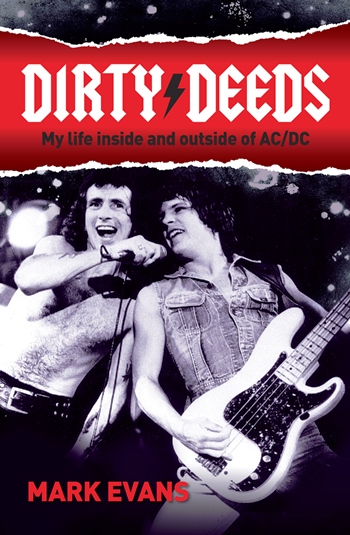Firstly, there’s been such a strong stream of Accadacca books in recent years that they’ve been hard to avoid when you consume a lot of musical non-fiction. Secondly, there’s no denying the band’s influence, both here in Australia and around the world.
This book from their formative days bassist, Mark Evans, ably assisted by ghost writer Jeff Apter, is one of the best. While I dug the breadth and rich factual texture of “AC-DC: Maximum Rock ‘n’ Roll” by Sydney writer Murray Engleheart, the attraction of this first-person tale is compelling and simply explained.
It’s all in the telling of the tale. Evans signed on at a crucial stage of AC/DC’s development, when they were breaking and on the way up. He played on their defining (early) albums. They weren’t yet rock stars and there’s clearly no shit about Evans. He’s not full of anyone else’s, let alone his own. He admits his own failings in maintaining his place in the curious eco-system that is Young Brothers World. Ultimately, he was booted out. But he comes across as the sort of bloke you’d want to have a beer with.
Evans’ insights into the inner workings are invaluable in understanding how AC/DC ticks. More than any by Dave Evans, the band’s original vocalist for five minutes who (understandably) trades on his fleeting membership, but was long gone when his namesake signed on. Straight out of a Housing Commission flat and onto the stages of the burgeoning Australian beer barn and club circuit -which back then was probably the hardest musical school populated by the most demanding audiences of any in the world.
You might suspect the telling of his story has been influenced by a court case between Evans and his former bandmates. He acknowledges that (it was settled and there’s a non-disclosure clause) so the finer details are absent. But if there’s a regret Evans conveys it’s that he’s never reconciled face-to-face with the Youngs. Given Malcolm’s medical issues and history, that’s not going to change.
If there’s a one word take-out about the way the Youngs run AC-DC it’s Ruthless. Evans’ axing in 1977 was something he saw coming after some run-ins (blows were exchanged) in the lead-up but there was also a sense of denial as the dirty deed was done. The overwhelming message is that Evans wanted to be closer to the Youngs throughout their shared trials and tribulations on the road but that’s a place that few, if any, get to be.
The sourest note seems to be struck by Evans’ omission from induction into the Rock and Roll Hall of Fame. There was a statement made that he was “in” only for it to be revised.
There are some great road stories in “Dirty Deeds” and they’re told with good humour and self-deprecation. The high points make you wish you were there. You can’t ask much more on both counts.
Evans had quite a career post AC-DC (Finch/Contraband, The Beast, The Party Boys, Cheetah, Swanee, Heaven, Headhunters and the contemporaneous Tice and Evans.) There’s a good chunk of Oz Rock history right there in those names, and although much of it is glossed over it’s not what most people came here for anyway.
There’s a jarringly sad note with the book closing after the tragic death of his eldest daughter Kirstin in a truck-meets-bicycle accident in Amsterdam. It puts some of the low-points that precede it into stark perspective.


 A quick trawl through the memory banks shows that AC/DC books have figured more prominently on my personal playlist in recent years than almost any others. You’re entitled to ask why.
A quick trawl through the memory banks shows that AC/DC books have figured more prominently on my personal playlist in recent years than almost any others. You’re entitled to ask why.